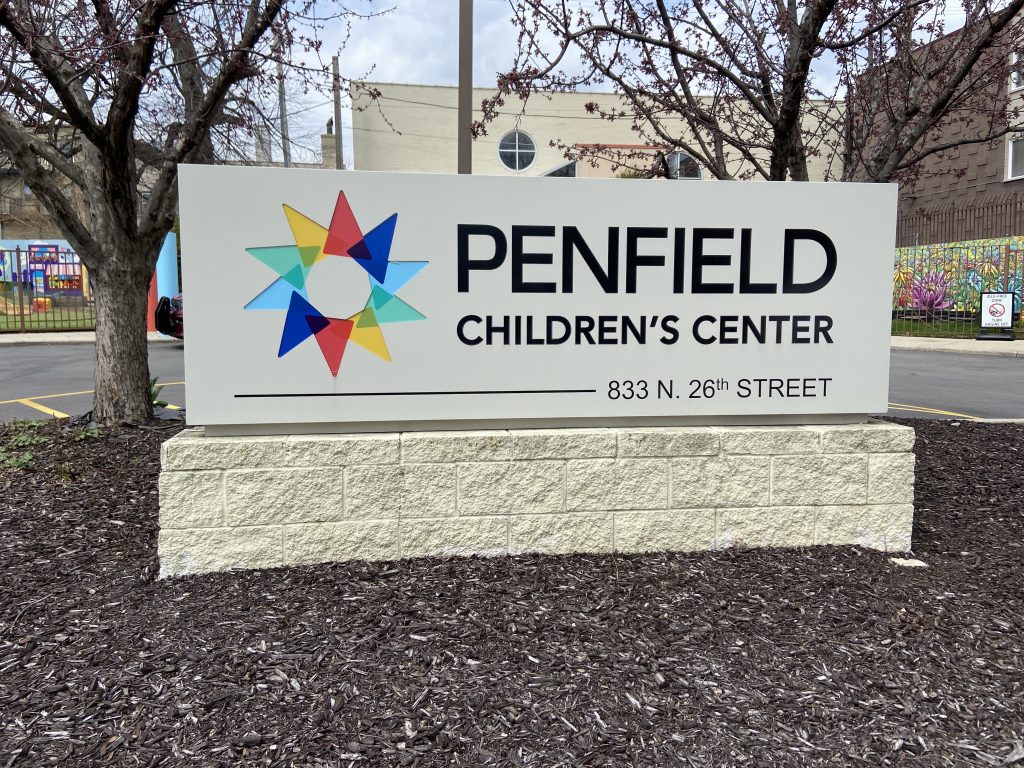Coalition Pushes For Early Childhood Funding
Federally mandated Birth to 3 program underfunded by state, on unsustainable path.

Penfield Children’s Center. Photo taken April 22 by Graham Kilmer.
County Executive David Crowley held a press conference Tuesday calling for greater investment in early childhood development programming.
Specifically, the county is seeking funding support from the state and federal government for the Birth to Three program, which provides therapy for infants and toddlers with developmental delays. The state has not provided enough funding to keep up with the cost of the program, and it has placed it on an unsustainable path with enrollment increasing and program capacity declining, according to county officials.
Crowley joined local Birth to 3 providers in calling for greater funding in the next state biennial budget and tying funding to program enrollment, which is increasing.
Birth to Three provides early childhood intervention for children who are experiencing development delays during the critical first three years of life. The program provides evaluations; identifies physical, speech or visual delays; and provides referrals for programing to address them.
“[The programs are] real, tangible supports that help a child say their first word, take their first steps, hold a parent’s hand for the very first time,” said Dr. Ben Weston, chief health policy advisor for Milwaukee County. “And the science is clear, when we act early, children are better prepared for kindergarten. They require fewer special education services later on, and they’re set up for a lifetime of learning, of health and of growth.”
Since 2018, the county has lost two-thirds of its Birth to Three program providers, said Shakita LaGrant-McClain, director of the Department of Health and Human Services.
The organizations have incurred budget deficits in order to maintain the program, and as a result most have stopped providing it.
County policymakers have been desperately trying to hang onto the program providers they still have. And the administration has worked with the Milwaukee County Board of Supervisors in recent years to scrape together additional funding for the county’s Birth to Three program to lighten the blow to provider budgets.
Advocacy for Birth to Three funding is another place where the Crowley administration is pressing state leaders to provide greater funding to programs the county is required to administer.
The Birth to Three program is federal entitlement program, included in the 1975 federal Individuals with Disabilities Education Act. Funding for the county’s program comes from the federal and state government and Medicaid reimbursement. But as both government revenue and Medicaid reimbursement have fallen behind, more and more of the cost falls to the county’s bottom line.
“And that means that nearly 50% of the funding for Birth to three Programs is coming from the county, and that’s just not sustainable for us as a community,” Crowley said.
Meanwhile, enrollment in the program has increased 19% statewide since 2020.
The county is entering a financially turbulent period, facing projected budget deficits in coming years of unprecedented magnitude as federal stimulus funding runs out and as pension costs eat up all of the new revenue generated by the additional 0.4% sales tax implemented last year. Recent projections by the Office of the Comptroller show the county is headed for a $47 million budget shortfall in 2026, and a $171.6 million by 2030.
While the programs are indispensable for the families accessing them, Crowley’s administration is also trying to communicate the community-wide social benefits of supporting children.
“By investing in [Birth to Three] — Wisconsin, Milwaukee — we can build a stronger foundation for the K-12 education system, to help improve the child’s readiness for kindergarten,” LaGrant-McClain said.
Penfield Children’s Center is one of the organizations providing Birth to Three programming. Last year, it served more than 1,200 children in Milwaukee County, said Polina Makievsky, president and CEO of Penfield Children’s Center. Last year it also had a $1 million funding gap it needed to close to keep operating.
Despite the program being a federal entitlement, Penfield has to find money to keep the program going. Its efforts have included leaning on billing for Medicaid and private insurance and pursuing philanthropic support for the program.
“And when all of those funds come together, there’s still a gap,” Makievsky said. “We have been dipping into our reserves to cover the gap.”
In Milwaukee County, a majority of children that are eligible for developmental intervention are still not accessing it. Penfield estimates that as few as 27% of eligible children access Birth to Three programming each year.
“What happens when a child doesn’t achieve access to these services? They show up to school not prepared and ready to learn on day one, and that leads to a cascading effect of failure and stress for families and that child,” Makievsky said. “Here’s the good news. This is all largely preventable.”
She and the county executive are part of a coalition pushing for a $10 million increase in funding for the program in the next biennial budget, and tying funding to enrollment to ensure its long-term sustainability.
“This is really smart public policy,” Makievsky said, “and doing what’s right for children and families in the state of Wisconsin.”
If you think stories like this are important, become a member of Urban Milwaukee and help support real, independent journalism. Plus you get some cool added benefits.
Political Contributions Tracker
Displaying political contributions between people mentioned in this story. Learn more.
MKE County
-
Fellow Judge Testifies in Dugan Case
 Dec 16th, 2025 by Graham Kilmer
Dec 16th, 2025 by Graham Kilmer
-
Key Questions in Dugan Trial Take Shape on First Day
 Dec 15th, 2025 by Graham Kilmer
Dec 15th, 2025 by Graham Kilmer
-
FTA Tells Milwaukee to Crack Down on Fare Evasion — Even Where Fares Don’t Exist
 Dec 12th, 2025 by Graham Kilmer
Dec 12th, 2025 by Graham Kilmer





















